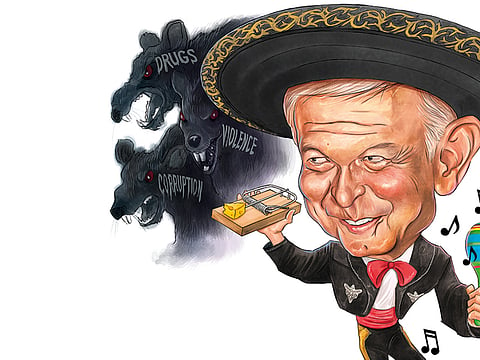Andres Manuel Lopez Obrador: The homespun firebrand
‘Amlo’ wins presidency in a landslide and plans to reshape the country as never before

Riding a wave of populist anger fuelled by rampant corruption and violence, the leftist, Andres Manuel Lopez Obrador, was elected President of Mexico in a landslide victory that upended the nation’s political establishment and handed him a sweeping mandate to reshape the country.
Lopez Obrador’s victory puts a leftist leader at the helm of Latin America’s second-largest economy for the first time in decades, a prospect that has filled millions of Mexicans with hope — and the nation’s elites with trepidation.
The outcome represents a clear rejection of the status quo in the nation, which for the last quarter century has been defined by a centrist vision and an embrace of globalisation that many Mexicans feel has not served them.
The core promises of Lopez Obrador’s campaign — to end corruption, reduce violence and address Mexico’s endemic poverty — were immensely popular with voters, but they come with questions that he and his new government may struggle to answer.
How will he pay for his ambitious slate of social programmes without overspending and harming the economy? How will he rid the government of bad actors when some of those same people were a part of his campaign? Can he make a dent in the unyielding violence of the drug war, which left Mexico with more homicides last year than any time in the last two decades?
And how will Lopez Obrador, a firebrand with a tendency to dismiss his critics, govern?
In the end, the nation’s desire for change outweighed any of the misgivings the candidate inspired.
In his third bid for the presidency, Lopez Obrador, 64, won in what authorities called the largest election in Mexican history, with some 3,400 federal, state and local races contested in all.
He won by capturing more than half the vote, according to early returns, more than any candidate since the nation began its transition to democracy nearly 20 years ago. In a reflection of the huge mandate, his main competitors conceded the race within 45 minutes of the polls’ closing, another historical first.
It is likely that he will hold a majority in Congress, potentially giving him more power to enact his policies.
In his acceptance speech in Mexico City, Lopez Obrador, who is commonly referred to by his initials, Amlo, sought to unite an electorate polarised over his election, and promised to look out for all citizens — with the poor being first among them.
“I call on all Mexicans to reconciliation, and to put above their personal interests, however legitimate, the greater interest, the general interest,” he said. “The state will cease to be a committee at the service of a minority and will represent all Mexicans, rich and poor, those who live in the country and in the city, migrants, believers and nonbelievers, to people of all philosophies and sexual preferences.”
A global repudiation of the establishment has brought populist leaders to power in the United States and Europe, and conservative ones to several countries in Latin America, including Colombia after an election last month.
Lopez Obrador, who vowed to cut his own salary and raise those of the lowest-paid government workers, campaigned on a narrative of social change, including increased pensions for the elderly, educational grants for Mexico’s youth and additional support for farmers.
He said he would fund his programmes with the money the nation saves by eliminating corruption, a figure he places at tens of billions of dollars a year.
Realistic or not, the allure of his message is steeped in the language of nostalgia for a better time — and in a sense of economic nationalism that some fear could reverse important gains of the last 25 years.
In this way, and others, the parallels between Lopez Obrador and US President Donald Trump are hard to ignore. Both men are tempestuous leaders, who are loath to concede a political fight.
Trump immediately posted a tweet congratulating Lopez Obrador, and the pair talked on the phone.
Even as the electoral rage propelling Lopez Obrador’s rise is largely the result of domestic issues, there will be pressure for the new president to take a less conciliatory line with his American counterpart. Mexico’s current government, led by President Enrique Pena Nieto, has suffered a string of humiliations at the hands of Trump with relative silence.
But Lopez Obrador is not the typical Latin American populist, nor does his branding as a leftist convey the complexity of his ethos.
In building his third candidacy for the presidency, he held together an odd group of allies, some with contradictory visions. There are leftists, unions, far-right conservatives and support from religious groups. How he will manage these competing interests remains to be seen.
Lopez Obrador will inherit an economy that has seen only modest growth over the last few decades, and one of his biggest challenges will be to convince foreign investors that Mexico will remain open for business.
If he fails to convince the markets that he is committed to continuity, or makes abrupt changes to the current economic policy, the country could find itself struggling to achieve even the modest growth of prior administrations.
There is some evidence that Lopez Obrador knows what is at stake. Though political rivals have painted him as a radical, Mexico’s president-elect has vowed not to raise the national debt and to maintain close relations with the US. Lopez Obrador has a history of working with the private sector, and has appointed a respected representative to handle negotiations the North American Free Trade Agreement.
Looking ahead, Mexican voters believe that if anyone can bring about all the changes, Lopez Obrador is the best bet.
— New York Times News Service



